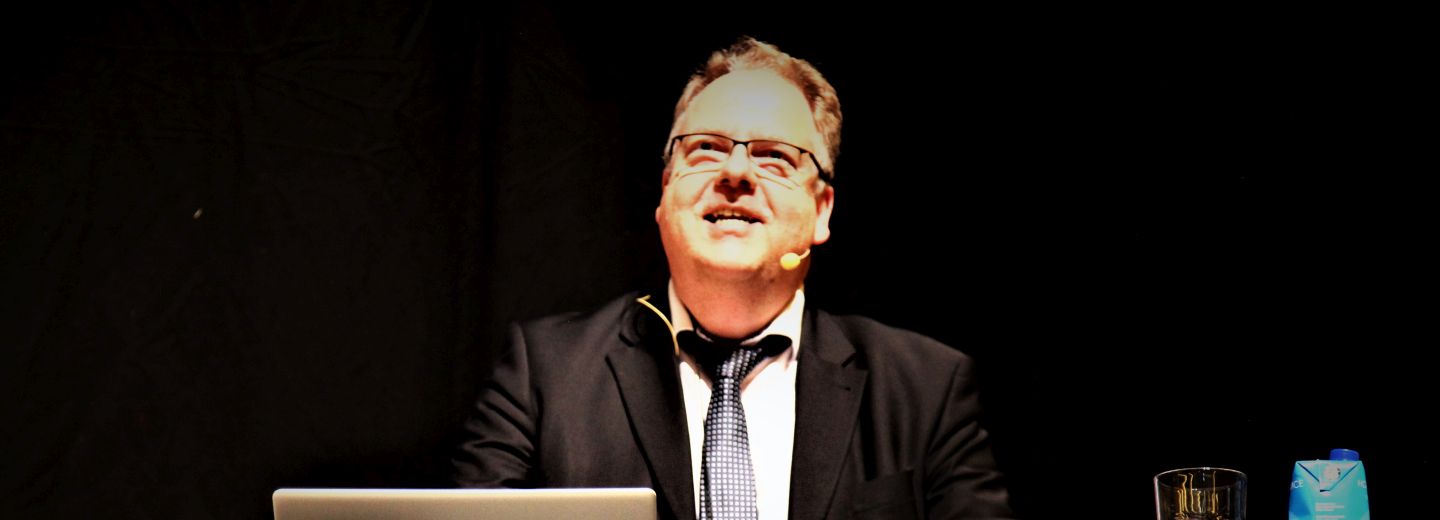
Head of CIE Thomas Ebel has been appointed professor
56-year-old Thomas Ebel has been appointed professor of Advanced Capacitor Technologies. It has been four years since he took over as head of Centre for Industrial Electronics at SDU. Ebel has impressively managed to build the centre from scratch, so that CIE now stands as an example to follow when it comes to training engineers, state-of-the-art laboratories and industrial cooperation.
SDU has appointed Thomas Ebel as professor in the field of Advanced Capacitor Technologies. On this occasion, the Department of Mechanical and Electrical Engineering invites you to an inauguration lecture and subsequent reception on 16 September.
So far, it is an academic highlight of a career that had its tentative beginnings when Thomas Ebel's father bought him a chemistry set. The then 12-year-old Thomas Ebel threw himself headlong into all kinds of experiments to such an extent that his father had to build an extra room where young Ebel could do experiments with acids, bases, electrolysis and much, much more. It was Thomas Ebel's first laboratory. Today, the 56-year-old has several laboratories.
As head of Centre for Industrial Electronics (CIE), Ebel is responsible for the 3,200 square metre large CIE building. The building is packed with high-tech laboratories and project rooms; for the benefit of teaching, research and industrial cooperation.
From building site to high-tech lighthouse
When Thomas Ebel was elected to head CIE on April 28, 2018, the centre consisted of nothing more than a building site with giant machines and construction workers and a vision of a strong and committed collaboration between industry and the university on education and development based on the highest quality research. A field and an idea, in short.
Today, the CIE building stands four stories high, and the vision has become a reality. The building contains several laboratories and the best equipment in power electronics. The centre's 21 researchers are winning prizes and the first engineering students have completed their education. At the same time, a successful cooperation with industry has been built up. An impressive performance. And of course an achievement that makes Ebel proud.
"We started from scratch, but thanks to a huge team performance, we have managed to build all this in an incredibly short time," says Thomas Ebel.
He goes on to say that he is particularly proud that everything is going as planned. That the lines that were laid out are followed. If not to the letter, then very close in terms of growth, hiring and revenue and more. But what has been the biggest challenge?
"To establish the close industrial cooperation we now have. It took a huge effort to get the first order in house. Once we got our foot in the door, successful projects and happy customers followed. It was hard work to get there. But we did it. And now we are experiencing a snowball effect, with customers and contracts pouring in. We have managed to create credibility. Companies trust us. It makes me proud on behalf of CIE.”
Fragile universe
Another thing that makes Thomas Ebel proud is when, in his spare time, he manages to capture and immortalise a distant galaxy or a nebula with his telescope and camera. Ebel is a passionate amateur astronomer.
"I think it's incredible that with relatively cheap instruments you can stand in your own backyard and take pictures of distant galaxies and nebulae. It is immensely fascinating. The starry sky and space make us think about where we come from and how fragile we are in a universal context. How small we are. And that we must take care of ourselves, the environment and our planet as a whole.”
CIE important catalyst for the green transition
At a time when it seems that nature is trying to break plenty of records, the fragility of our planet is not only something he philosophises about when he disappears into the starry sky through his telescope, but also a very concrete, tangible and professional matter for Thomas Ebel.
CIE is a beacon in energy-efficient technologies and a piece in the fight against global warming. A CO2-neutral future requires that the production, distribution and use of renewable energy become even more efficient. To that end, there are two solutions: To produce more green energy and to avoid waste in transport and transformation of energy. Both solutions require new electronics.
"Power electronics is a megatrend which is helping to shape our future and which is absolutely essential in the efforts to achieve the world's climate goals and combat global warming," says Thomas Ebel.
He goes on to say that it is a great honour to help accelerate the green transition. CIE thus helps major car manufacturers to improve batteries and components in electric cars. The centre's researchers are at the international top level in the development of future capacitors, converters, drivers and they also have their finger on the pulse when it comes to Power-To-X.
"And it's not just our researchers who make a difference. For me, it has been a personal highlight to teach knowledge-hungry and highly motivated engineering students. Young people who are future engineers who go out into the world and help companies with the essential issues and challenges in connection with global warming.”
Professor Thomas Ebel's inauguration ceremony
Friday 16 September at 13.00-15.30
Programme
13.00 Opening of ceremony by Prof. Christian T. Veje, head of the Department of Mechanical and Electrical Engineering at SDU
Inaugural lecture: Prof. Thomas Ebel, Head of SDU Electrical Engineering and Centre for Industrial Electronics, SDU DME, Advanced Capacitor Technologies
Lecture by Professor Harald Giessen, Director, 4th Physics Institute, University of Stuttgart, 3D printed micro-optics: From optical elements to entire systems
Lecture by Professor Marco Liserre, Head of the Chair of Power Electronics, Christian-Albrechts-Universität zu Kiel, New technologies and materials as drivers of tomorrow's power electronics
15:00 Refreshments
15.30 Goodbye and thank you